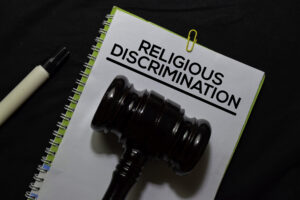What Constitutes Religious Discrimination in the Workplace?
Religious diversity and religious freedom are fundamental principles of the United States. Unfortunately, reality doesn’t always live up to the nation’s ideals, and people sometimes suffer religious discrimination.
Perhaps you lost a job or weren’t hired in the first place because of your religion (or lack thereof). Maybe your boss treats you differently or doesn’t allow you to follow your religious practices. If any of these describe your situation, you may have a religious discrimination claim.
In this post, Kansas City’s notable employment lawyer explains what constitutes religious discrimination and what you can do if it happens to you.
What Is Religious Discrimination?
People treat each other differently every day for various reasons. But it’s illegal for an employer to make job decisions based on your religious group or affiliation.
Specifically, Title VII of the Federal Civil Rights Act prohibits employers from doing the following:
- Refusing to hire candidates because of their religious beliefs
- Forcing employees to participate (or not participate) in religious activities
- Making policies expressing religious discrimination or limitations
- Determining benefits, hours, compensation, promotions, and terminations or making other employment decisions based on religion
- Classifying or limiting employees because of their religion
- Neglecting to stop known religious discrimination in the workplace
- Failing to provide reasonable religious accommodation
What Are the Types of Religious Discrimination?
Religious discrimination typically falls into the following categories:
Discrimination
Whenever employers make employment decisions based on religion, they are engaging in religious discrimination. Examples include not allowing an employee to wear a head covering,
refusing to promote someone because of their religion, firing someone because of their religion, or forcing all employees to participate in religious observances.
Harassment
Harassment is a form of discrimination that is more personal and threatening. If your boss or coworkers taunt you, call you religious slurs, make physical threats, or otherwise create a hostile work environment because of your religion, you may have a harassment claim.
Failure To Make Reasonable Accommodation
Finally, the law requires employers to permit you to engage in religious observances and practices (as long as it doesn’t create undue hardship on the employer). This means they may have to allow you to wear a headscarf, grow your hair long, or leave work early for a religious ceremony.
Who Does the Law Protect?
In addition to knowing what constitutes religious discrimination, you should know who anti-discrimination employment laws protect.
This part is simple to understand (if not always to prove). The law protects anyone who has sincerely held religious beliefs — even if they don’t belong to an organized mainstream religion. Anti-discrimination laws also apply to atheist employees.
All government employers must follow Title VII, as must private employers with at least 15 employees.
Contact Dugan Schlozman To Learn More About Your Options
Now that you know what constitutes religious discrimination, you may have a legal case. If so, working with an attorney is an excellent way to move forward.
Like workplace racism, religious discrimination is not always easy to prove. You need a lawyer who understands the applicable laws and has experience gathering evidence to support cases like yours.
To schedule a consultation with an experienced Kansas City discrimination lawyer, call Heather Schlozman or Mark Dugan at DuganSchlozman LLC at 913-374-6351 or contact us online.


